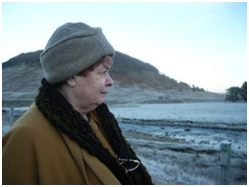To the
great sorrow of many of us around the world, Dr. Ann Cattanach passed away on
November 6th, 2009. Dr. Cattanach was indeed the first lecturer to our annual
play therapy training program instructed by invited trainers from abroad.
At the Wroxton Study Group in Britain, Dr. Akiko Ohnogi, board member of JAPT,
gave a presentation on the “Present Situation of Play Therapy in
Japan.” Dr. Cattanach, on hearing about the strong motivation of Japanese
therapists for gaining higher knowledge and skills in play therapy, and the
lack of opportunity to receive proper training in Japan, offered to come to
Japan herself to create that opportunity.
This genuine offer from Dr. Cattanach set off what we have today, as it was
from there we formed a small team, calling on many people and receiving various
kinds of support, culminating in our seminar series where play therapists and
trainees come together from all over Japan. When we think of Dr. Cattanach’s
exceptional enthusiasm, our hearts are filled with our deepest gratitude.
In Japan, Dr. Cattanach’s lectures and workshops were filled with passion,
humour and love, inspiring and encouraging the participants. Dr. Cattanach,
too, was truly touched by the enthusiasm and quality of play therapists in
Japan, and had promised to come back to Japan again to teach us. She acted as
board advisor of our organization and continually gave us her support. So many
of us were hoping to surely see her in Japan once more in the near future.We
are filled with feelings of loss and sorrow, that our announcement had to be
that of Dr. Cattanach’s passing, and not her next visit to Japan.
We are realizing anew the greatness of what Dr. Cattanach has passed on to us,
and also how lucky we were to have met her even once. We hope to continue
nurturing among ourselves, the spirit and lessons we learned from Dr.
Cattanach, and to continue our journey in learning from her.
With such hope, as a special feature, we plan to share with others the gifts we
received from Dr. Cattanach and continue to rediscover what she taught us. This
message in posted in both English and Japanese, hoping that it could be shared
with her family members who deeply love her, and with play therapists around
the world.
Takako Yuno
President, JAPT
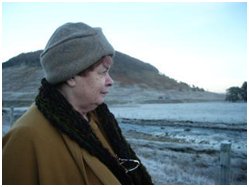
[
Ann Cattanach, MSc, Ph.D. ]
Ph.D. in play therapy research. Private practice in Scotland. Various lectures
on play therapy and psychodrama in Scotland, England, Malaysia, Singapore, and
the Netherlands. Full member of the British Association of Play Therapists.
Visiting fellow at York University. Founder Graduate Diploma/MA in Play
Therapy, Roehampton University. Child Care Consultant Therapist , Highland
Social Services and elsewhere in the UK and overseas. Board Advisor of Japan
Association for Play Therapy. Multiple publications including,“Introduction to Play Therapy”(Brunner-Routledge, 2003), “Narrative Approaches in Play with
Children” (Jessica Kingsley Publishers, 2007).
Tribute
to Dr. Ann Cattanach
Participants of the 2007 Summer Workshop undertaken by Dr. Ann Cattanach have
sent us their thoughts on the precious moments shared together with her.
(During the workshop held in Japan, some participants called Dr. Cattanach,
Ann-Sensei, and do so in the following messages. In Japanese, the word
“Sensei” is used with respect when referring to a professional such
as a teacher or a doctor. It is usually used together with one’s last name, but
when expressing feelings of closeness or friendship, it can be used with the
first name. Thus, people have expressed such feelings by calling her that way
in these messages.)
“I had a dream about Ann-sensei last Friday. She was wearing a navy dress
and with a mischevious smile said, “We’re done working for the day. Let’s
all go have a drink!”. I think that was a scene from the last time I
actually saw Ann-sensei on the last day of the workshops at the hotel. This
made me wonder if anything had happened to her. I am extremely saddened that my
premonition came true, however, I have come to the realization that, just as in
this dream, Ann-sensei will always be in my heart as a kind and strong person
who will forever support me. I am sad, but I am once again grateful that I had
the opportunity to meet someone like Ann-sensei.”
Chiaki Kubo, AN Clinic
Ann-sensei,
You were the first true “witch” that I had ever met in my life. Not only as a clinician, but as a
human being, I was strongly attracted to you and wondered, “What is it like inside this person?” There
was a strange feeling of something deep, spacious, fun, a little spooky, but at
the same time comforting. Behind those sharp twinkling eyes, Ann-sensei, you
were always smiling at us with warmth. That is why I think that your narrative
therapy must be like living in a special time and place, as if in outer space,
or in a dream. I envy the children who got to experience that, and I also want
to become a clinician that can make that happen.
I had only one opportunity to meet you, but I will always treasure it. I will
always keep it and cherish it.
Best wishes in Heaven. Thank you so much.
PS.
I also want to meet a fairy, So if you can, if you happen to see one, could you
ask her to come to see me?
Yuu Terasawa
I sometimes thought about Dr. Ann Cattanach. My image was always of her driving
along the countryside of Scotland in her car. Of course she has her toys and a
carpet in her car, and she would knock on a client’s
door. I wonder if she is doing the same in Heaven, too.
I learned from her the inner strength and loving care of the play therapist. I
think that play therapists need unshakable inner strength particularly when
conducting play therapy with abused children, because it is the play
therapist’s inner strength that will become a model for the children who are
trying to survive in spite of their overwhelming experiences. As to loving, I
admired her deep understanding toward children’s grief and pain, and her
enormous ability to enfold them in her arms.
Mayumi Seida
Publications
by Dr. Ann Cattanach
Following are the main books written by Dr. Ann Cattanach. She has also
contributed to many significant publications on play therapy and art therapy
other than those listed here. When we go through her writings, we have the
continued opportunity to gain necessary and significant insights that will
guide us through our clinical experience.
We would like to introduce a message from Jessica Kingsley Publishers, a
British publishing company that has a deep connection with Dr. Cattanach and
has published most of her books. We are grateful to Jessica Kingsley for
allowing us to introduce their message here for the Japanese readers.
[Message from Jessica Kingsley Publishers]
JKP first published Ann Cattanach’s work in the early 1990’s, by which time she
was an established play therapist, confident in her ability to help young
children who had suffered abuse, and knowing she wanted to share the skills she
had. Play Therapy with Abused Children, published in 1993, was a profoundly
moving book, and deeply affected everyone at JKP who worked on it. Without any
hint of prurience, she took the reader into the lived experience of the abused
child, and offered the professional reader wise paths to reaching and helping
the child find healing and recovery. When I asked her how she could bear to do
such costly work, and to hold such pain, she simply laughed and pointed to
herself, and said `I eat’.
The experience of publishing such a book, and the example of the author who
wrote it, was without doubt one of the key influences in how JKP went forward
from there, and that the company identified itself so strongly as publishing
and wanting to focus on publishing `books that made a difference’. Ann’s later
books without question `made a difference’, and the people who worked with her
at JKP continued to learn from her too. Her books were not only wise and
sensitive, but intellectually rigorous, and asked a great deal of the reader – not so much in terms of
understanding as of courage and integrity. It was a great personal pleasure
when these were put forward for a PhD, just recognition for someone who had
contributed enormously to her field. She will be very much missed.
Jessica Kingsley
November 2009
1993, Play Therapy with Abused Children (2008 second edition), UK , Jessica Kingsley
Publishers
1994, Play Therapy : Where the Sky Meets the Under World, UK , Jessica Kingsley
Publishers
1997, Children’s Stories in Play Therapy, UK , Jessica
Kingsley Publishers
1999, Process in the Arts Therapies, UK , Jessica Kingsley Publishers
2002, The Story So Far: Play Therapy Narratives, UK , Jessica Kingsley
Publishers
2003, Introduction to Play Therapy, New York , Brunner-Routledge
2006, Storywater, UK, Grosvenor House Publishing Limited
2007, Malpas the Dragon, UK , Jessica Kingsley Publishers
2007, Narrative Approaches in Play with Children, UK , Jessica Kingsley
Publishers
2009, Play as Therapy: Assessment and Therapeutic Introductions (forwared by
Ann Cattanach), UK , Jessica Kingsley Publishers
Workshops
by Dr. Ann Cattanach
July 28, 2007
Support for Parenting Workshop “The Power of Play – Understanding the
Child”
This workshop was held on the very first day of the first year in which the
Japan Association for Play Therapy started to host its series of foreign guest
speaker programs. The turn-out was very strong with more than 100 participants
(Venue: Tokyo Womens’ Plaza main hall, 113 participants). It was an event where
people who are presently undergoing parenting in Japan, and people who are
supporting those who are parenting, listened to the guest speaker and took part
in activities of the workshop.
We offered a chair to Dr. Ann Cattanach, but she said, “I want to stand
and talk. I don’t need a chair” and remained standing throughout the
workshop. She devoted herself entirely, as if she was trying not to waste even
a minute or a second, in reaching out to each and every participant. Based on
her principle, “To nurture good families, good children, and to create a
good society”, she introduced us to actual cases and participatory
hands-on activities, which made the workshop an unforgettable experience.
One of the experiential activities that Dr. Cattanach introduced to us went
like this:
If you were a bird, what kind of bird would you like to be?
If you were a flower, what kind of flower would you like to be?
If you were an animal, what animal do you think you would be?
If you were a color, what color?
If you were a tree?
If you were a fruit?
If you were a fish?
If you were a vegetable?
If you were a car, what kind of car?
What kind of house?
What kind of music?
“Break up into pairs. Share each other’s worlds with your partners, what
you chose and the reason why you chose it” said Dr. Cattanach.
The participants were surprised at first, but gave the task a go. The room was
soon full of liveliness, just as Dr. Cattanach had hinted: “It’s important
for both the parent and the child to be in this together. I bet you will
experience fun and discovery.” One participant commented, “Her explanation was playful, and
that’s why I was able to enjoy the whole workshop.”
What we had explained to Dr. Cattanach beforehand was the fact that the social
situation in Japan today was much more complicated than before, and that that
was one of the reasons behind the confusion that parents, and those who are
supporting parents, were facing. We had asked her, “What
is the essence of parenting? What should we keep in our minds when we are
parenting, or supporting those who are parenting? We would like you to give us
some key points.”
Dr. Cattanach’s reply went like this, “I have worked in many countries
such as England and Ireland, and what is necessary in our work is for it to
make sense in that certain culture. It is very important for you to discern
whether what I tell you really fits your culture here in Japan.” She
taught us how important it was for the care-taker or supporter to always try to
imagine and make sense of the other person’s life and culture that s/he
carries. At the same time, she also reflected on the importance for us to
deepen our understanding of our own lives and our own cultures, and when
listening to our clients, to listen proactively and to carefully examine
whether what we are hearing makes sense to us.
Dr. Cattanach introduced to us cases of children in England whose parents were
heavily addicted to narcotics, or who had experienced sexual abuse in their
homes. Although participants were surprised to hear about these serious
realities, their comments showed that the lecture had provided them with
inspiration and various hints: “I understood the importance of a caring
adult or a therapist to be there together with the child in the child’s
imaginative world.” “The various cases shared to us were very
interesting.” “I learned that it is not always necessary to forcefully
connect the context of the child’s play to her/his reality.”
As was stated in the last comment, Dr. Cattanach does not try to unduly connect
the child’s world of play to the child’s harsh experience in reality. If a
child experiences some sort of abuse or is victimized in some way, s/he carries
a past that is hurtful, confusing, and difficult to consciously face. By having
an adult who is able to watch over and form a safe relationship, the child is
given an opportunity to express his/her painful and confusing feelings about
his/her past through play and fantasy. Through this process, the child tries to
place his/her past experiences into order and to face his/her story. Dr.
Cattanach also taught us that, through encouraging the child to make real life choices
and showing him/her that “You are the one who can make choices about your
life”, the hands of the clock of the victimized child’s life that had
seemed to have once stopped, starts ticking again towards the future. This can
be done without the adult having to unduly connect the child’s fantasy to
his/her reality.
Dr. Cattanach has experienced so many meaningful experiences, that it seems
almost impossible for just one person to have accomplished all of them. I
believe that what she did was to place all those experiences and wisdom into a
seed, and plant that seed into each and every one of us. Even though several
years have passed since we said good-bye to Dr. Cattanach on the last day of
that workshop, when participants of that workshop get together again, somebody
starts saying, “Remember that activity we did at Dr. Cattanach’s
workshop….” or “Remember that story she told us ….”. So many
times do we have the experience when we are with a child, that we suddenly
understand the meaning of something Dr. Cattanach had told us before. We
experience this with a great sense of wonder. What we must not forget is that
even in a child’s heart that has experienced pain, if
an adult with this kind of belief and wisdom does not give up and continues to
be with the child, that a seed may be planted, and may blossom in the future.
The time we spent with Dr. Cattanach was very short, but what we learned was
immensely deep.
JAPT
Satoshi Kuzuu
Photos

Ann Cattanach, lecture for parents with interpretor and JAPT vice president
Satoshi Kuzuu

first row: Kayoko Murase (Japanese Association of Clinical Psychology
President), Ann Cattanach, Akiko Ohnogi (JAPT Director, lecturer); second row:
Satoshi Kuzuu (JAPT Vice President), Takako Yuno (JAPT President), Judy McCormick
(lecturer)
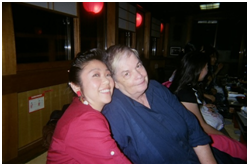
Ann Cattanach & Akiko Ohnogi on yakatabune
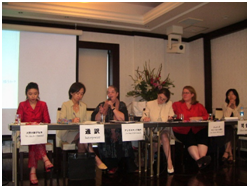
from left to right: Akiko Ohnogi, interpretor, Ann Cattanach, interpretor, Judy
McCormick, case presenter
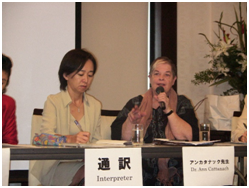
Ann Cattanach and interpretor

Ann Cattanach eating her favorite shrimp tempura
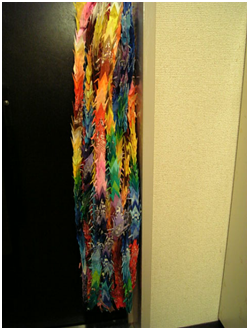
Senbazuru Prayers for Ann’s
recovery Upon learning of Ann’s illness, I asked for
volunteers from those who knew Ann from having attended her summer workshops
the previous year, to make origami cranes to create a string of 1000 cranes
(senbazuru 千羽鶴) for her. In Japan, there is a legend
that folding a thousand origami cranes will grant a wish, and thus, when a
person becomes ill, those who care about this person will create 1000 cranes
and string them together and present it to the sick person, wishing for his/her
recovery. Cranes are folded as they are one of the 3 mystical creatures and are
said to live for a thousand years. About 30 people participated, and in about a
month, the 1000+ cranes were made and strung and sent to Ann’s daughter Sarah, who took it to Ann’s
hospital, where it was strung in her hospital room during her stay there. When
I visited Ann last summer, she had the cranes strung in her bedroom, stating
that they were one of the important items that helped her through the emotional
and physical pain of the operation and treatment. Upon Ann’s death, Sarah placed the cranes in Ann’s
coffin with her to accompany her to her next stage of being, recognizing that
those cranes meant a lot to Ann during her courageous fight against cancer. (Akiko
Ohnogi)

Senbazuru hanging in Ann’s bedroom in Edinburg
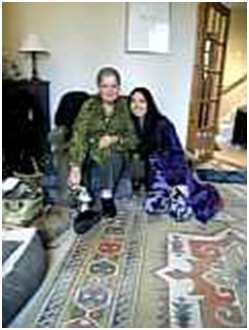
Ann Cattanach and Akiko Ohnogi at Ann’s house in Edinburg, June 2009 (4 months before Ann passed away)
